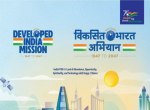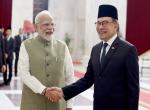Elections 2012 have been over for some time. Media and public have analyzed the results. Political parties are currently busy either celebrating or finding alibis for failure. They also claim to be waiting for a deeper analysis. In the public view the grand old party has received a solid drubbing including in Uttrakhand where they should have won hands down after Pokhriyal did the BJP in, to start with and even after he has done the Good General Khanduri in, through sabotage. They have just about managed to form a government with a contrived majority of one.
Political parties, some glibly, others apologetically and still others blatantly, have coined excuses howsoever belabored, for their failure or that of their vote banks. Others have tried to take credit where there is none. None; not even Maya and Digvijay have admitted defeat with a modicum of grace. Media with their 24 by 7 noise have contrived the highest ever TRPs through mischievous speculations. The dust has yet not settled down fully. Party spokespersons remain as bitterly antagonistic and diversionary as ever, each trying to defend the indefensible and parrying the truth. Our political parties can hardly be expected to speak of learning the right lessons or making a fresh beginning. Grand standing is the order of the day.
So, what are the lessons that our politicians, political parties and the electorate need to take away from these elections? An ordinary citizen voter could hazard a few.
The first of these is perhaps more in the nature of an observation to be noted for the benefit and happiness of all. The Indian voter is astute and wide awake. He has recognized what our politicians and political parties are worth. CWG, 2G, Yeduarappa, Maya Jal, and umpteen other episodes of corruption as also Anna and Ramdev movements are not lost on him/her. Yet, politicians and political parties being a necessary evil in democracy, they have – under duress perhaps, voted for stability, development and hopefully for better governance. The voter has effectively served notice on the chosen parties that severe retribution is in store if his expectations are belied. This is also the first lesson for the Yadavs, Badals, Manohar , Ibobi and whosoever is anointed Chief Minister in Uttrakhand.
Then there is lesson for the losers regardless of whether they are bad losers or worse losers. The voter has shown encouraging signs of rejecting the politics of religion, caste, sub caste, forwards, backwards or most backwards. All Indians, regardless of which vote bank they are perceived to be part of, have demanded to be looked upon with respect and care. The Indian voter demands economic, educational, social and physical development in equal measure as a matter of right – not charity or largesse. In no uncertain terms he has told the political class that elephantine parks, Shared quota of poverty and not even I Pads or laptops will appease him any longer. He will take them but will not vote because of them.
The next lesson is essentially for the Indian National Congress but by extension it is also worthy of recognition by the Badals nd Yadavs. This time around it comes from Amethi and Rai Barreily. Next time it may well be posted from Malwa or Etah. The lesson is that dynastic politics is obsolete. It must be junked. High command culture needs to be jettisoned. People want their representatives to identify with them and not visit them merely on election eve as patronizing maharajas, maharanis, princesses or yuvrajs. Nor do people care much for eloquent but clever by half orators like Sushma, Jaitley,salman or Sibal and other legal luminaries fielded by all political parties, whose sole expertise is to weave clever arguments and justifications, thrusts and parries only to divide the electorate or obfuscate issues. People can see through them. They want their representatives to understand, reflect and represent their simple and straightforward hopes and aspirations and to remain accessible and answerable.
The biggest lesson is for congressmen only; if at all they care to learn. People recognize that the INC has long jettisoned the original Gandhi. They have not demonstrated the least respect for his political ideology or probity in public life. They are too far removed from the ideology of Jawahar Lal Nehru or even of Indira Priyadarshani as well. Present day Gandhis: if indeed they are Gandhis by any contrived lineage, have no claim whatsoever to the political or ideological legacy of any one of these leaders. Not even in matters of Secularism. Sonia, Rahul, Priyanka or for that matter Vadra do not belong either to that clan or to that class. Where is the question of legacy? They as also their sycophants and hangers on are surviving on mutual need and mutual exploitation, all aimed at personal survival and gains. The lesson for congressmen is that the party or their own perch will not last long unless they get out of this opportunistic relationship and return to their original democratic roots. Congress as a party has no long term future unless they jettison these pseudo Gandhis and find new leadership from within themselves and allow fresh leadership to emerge. These elections have given them that rare opportunity which they must not lose. There will certainly be an upheaval in the short term but that would be worth their while for the long term.
There is also a lesson for the BJP. For some time it has been evident that the party is struck somewhere in the middle of an ideological void. They do not seem to be able to decide whether to ape the congress or to follow the VHP. There has not been the slightest indication of clarity on the issue till now but Goa should give some hope. True, the Sunni Muslim voter and strident Hindu reactionary are severely antagonistic. This is historical baggage- pre partition .It is just possible that a serious enough effort at re conciliation has not yet been made. True also, that the pseudo secularists will do their utmost to thwart such reconciliation that has the potential to undo their game of Divide and Rule. Should the congress become significantly weak due to their own shortcomings and should the collateral unintended advantage accrue to the BJP the latter party must shed its blinkers , not walk blind folded into the quagmire of socially divisive politics into which they have been lead by the so called secularists. BJP’s future lies in becoming an all-inclusive party of Indians. Goa has shown them how.
But then, the Muslim voter must also take home a lesson. Have they achieved any worthwhile advantage by allowing the wily politicians to fan and then exploit their ghetto mentality? They need to recognize that they are just as much Indian as a Brahmin or a catholic is. Subhash Chandra Bose and Mohan Das Karam Chand Gandhi were the only two leaders of India who shunned division of Indians along lines of religion and caste. Both have been forgotten by our present day rulers and their vision has been dumped. We need to recognize that these sub identities are the result of political exploitation – not the cause of it. These group identities must not be allowed to override their primary identity as Indians. The future of Indian Muslims lies not with Islamabad, Jeddah or Tehran but within India. Electoral alignments for short term yet elusive gain can only perpetuate their exploitation and consequent exclusion from progress and development.
There is perhaps a lesson for the civil society too. The need for political reform or can we call it political renascence, has been recognized. Record voting percentages are indisputable evidence of the effects of anti-corruption movements on the mind of young India. They will no longer sit back and watch arrogant politicians intoxicated on power to talk down to them. It is for civil society to ensure that the momentum of the phenomenon is not allowed to die down by argumentatively down playing the essence and justification of these movements.
It is not easy for the present polity to self-reform themselves, given their narrow vested interests. They will surely need some help. Can we the people help make it a little easier for them? Can we give them a five year electoral holiday by putting in place a national government of political reconstruction. This would give them time and incentive to think afresh. Can civil society go for it?
Unless at least some of these lessons are learnt there may be no real take away from this massive democratic exercise of 2012. Some opportunities have indeed arisen. Let India not miss out on them. Civil society activists and media must seize the initiative and deliver an unambiguous message to the political class that their business as usual practices have to undergo drastic change.
Published Date : 28th March, 2012









Post new comment